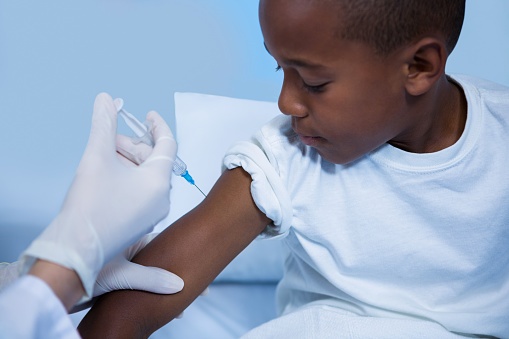According to the Centers for Disease Control and Prevention (CDC), the answer is “yes.” That’s because young children are “at high risk of serious flu-related complications,” with thousands of children hospitalized each year with the virus, and some even dying from the flu.
The best protection, the CDC says, is a flu vaccine, and so they recommend that children aged six months and up get one each year. Options include a flu shots and nasal spray vaccine, although the nasal spray isn’t approved for children younger than two or recommended for those with certain medical conditions. 
The CDC notes that some children, aged six months through eight years of age, need two doses of this vaccine; specifically, those who are getting vaccinated for the first time and those who have previously only been vaccinated once. The first dose should be given as soon as it’s available, with the second one at least 28 days later. The first dose “primes” the child’s immune system while the second one provides the actual immunity. If a child needs two doses but only gets one, he or she may have “reduced or no protection from a single dose of flu vaccine.”
An article by the Mayo Clinic shares that, although the nasal vaccine is expected to be more effective than in the past, the American Academy of Pediatrics still recommends the flu shot as the best method for protecting children. Be sure to talk to your pediatrician about what’s best for your child and note that it can take up to two weeks after vaccination for flu protection to take place. If your child needs two doses, this would mean two weeks after the second one.
Potential Side Effects
The Mayo Clinic lists potential side effects. With the flu shot, they can include soreness, tenderness, redness and/or swelling at the spot where the shot was given. Other side effects can include a low-grade fever, muscle aches, and a headache.
With the nasal spray, side effects can include a runny nose, sore throat and cough, along with wheezing, vomiting and/or fever. Additional ones include muscle aches and headache.
Special Circumstances
Flu vaccines typically contain a small amount of egg protein. If your child has an egg allergy, he or she may still be able to have the vaccine without problems but verify this with your pediatrician. If the egg allergy is severe, be sure to have the vaccination take place where a doctor experienced in severe allergic reactions is monitoring the situation.
If, for any reason, your child has had a severe reaction from a flu vaccine in the past, talk to your pediatrician. If the reaction is confirmed to be connected to the vaccine, the doctor may decide to not proceed with flu vaccinations.
More from the American Academy of Pediatricians (AAP)
To find more information about why the shot, not the nasal spray, is recommended for children—or to find related resources—find that information here.
Highlights include that, although the nasal spray worked well when it first came out over ten years ago, they haven’t worked well for three straight seasons (2013/14, 2014/15, and 2015/16), so the nasal spray was not made available for the next two seasons. And, although it is back this year, the AAP doesn’t feel as though enough information is available yet to recommend it for use on children. The only exceptions are:
- if your child absolutely will not get the shot but will use the nasal spray
- if the doctor is out of the vaccine in shot form but has the nasal spray available
All will be re-evaluated for flu’s next season. For this year, though, the AAP favors the vaccine for protection against influenza.



